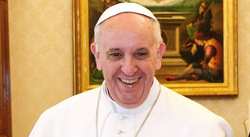
Dear Brothers and Sisters:
"Today I would like to speak again on the forgiveness of sins by reflecting on the power of the keys, which is a biblical symbol of the mission Jesus entrusted to the Apostles. First and foremost, we recall that the source of the forgiveness of sins is the Holy Spirit, whom the Risen Jesus bestowed upon the Apostles. Hence, he made the Church the guardian of the keys, of this power. The Church, however, is not the master of forgiveness, but its servant. The Church accompanies us on our journey of conversion for the whole of our lives and calls us to experience reconciliation in its communal and ecclesial dimension. We receive forgiveness through the priest. Through his ministry, God has given us a brother to bring us forgiveness in the name of the Church. Priests, who are the servants of this sacrament, must recognize that they also are in need of forgiveness and healing, and so they must exercise their ministry in humility and mercy. Let us then remember always that God never tires of forgiving us. Let us truly value this sacrament and rejoice in the gift of pardon and healing that comes to us through the ministry of priests."
"If we confess our sins he is faithful and just, and will forgive our sins and cleanse us from all unrighteousness. If we say we have not sinned, we make him a liar, and his word is not in us" (1 John 9-10).
"Today I would like to speak again on the forgiveness of sins by reflecting on the power of the keys, which is a biblical symbol of the mission Jesus entrusted to the Apostles. First and foremost, we recall that the source of the forgiveness of sins is the Holy Spirit, whom the Risen Jesus bestowed upon the Apostles. Hence, he made the Church the guardian of the keys, of this power. The Church, however, is not the master of forgiveness, but its servant. The Church accompanies us on our journey of conversion for the whole of our lives and calls us to experience reconciliation in its communal and ecclesial dimension. We receive forgiveness through the priest. Through his ministry, God has given us a brother to bring us forgiveness in the name of the Church. Priests, who are the servants of this sacrament, must recognize that they also are in need of forgiveness and healing, and so they must exercise their ministry in humility and mercy. Let us then remember always that God never tires of forgiving us. Let us truly value this sacrament and rejoice in the gift of pardon and healing that comes to us through the ministry of priests."
"If we confess our sins he is faithful and just, and will forgive our sins and cleanse us from all unrighteousness. If we say we have not sinned, we make him a liar, and his word is not in us" (1 John 9-10).
